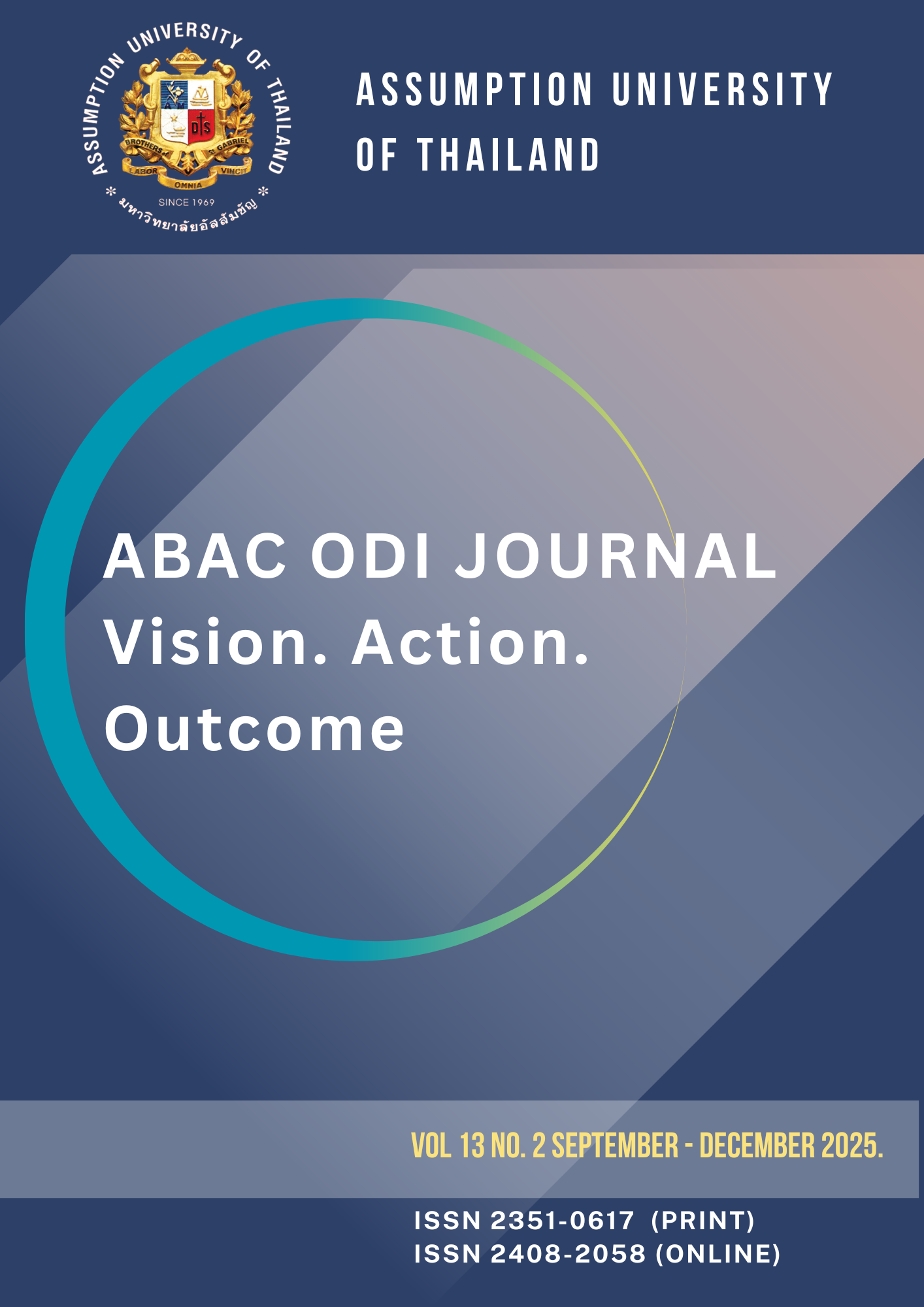Enhancing Academic Achievement and Psychological Well-Being Through Self-Efficacy, Self-Regulation, And Social Support: An Organizational Development Intervention Study Among Vocational Game Design Students in Beijing
DOI:
https://doi.org/10.14456/abacodijournal.2025.40Abstract
This study examines the impact of Organizational Development Interventions (ODIs) on self-efficacy, self-regulation, social support, psychological well-being, and academic achievement among 60 second-year vocational Game Design students at Beijing Polytechnic. A mixed-methods approach implemented four interventions— goal-setting workshops, coaching sessions, team-based learning, and positive psychology activities—over one semester. Paired-sample t-tests revealed significant improvements in all variables (p < .001). Qualitative data from interviews, observations, and assignment analyses highlighted increased confidence, structured learning behaviors, peer collaboration, emotional resilience, and academic performance. Rooted in social cognitive theory, self-regulated learning, social support theory, and positive psychology, the findings demonstrate ODIs’ effectiveness in fostering cognitive, behavioral, and emotional growth in creative vocational education. Recommendations inform curriculum development, faculty training, and institutional policy.
References
Bandura, A. (1977). Self-efficacy: Toward a unifying theory of behavioral change. Psychological Review, 84(2), 191-215. https://doi.org/10.1037/0033-295X.84.2.191
Bandura, A. (1997). Self-efficacy: The exercise of control. W. H. Freeman
Bandura, A. (2006). Toward a psychology of human agency. Perspectives on Psychological Science, 1(2), 164-180. https://doi.org/10.1111/J.1745-6916.2006.00011.X
Basileo, L. D., Otto, B., Lyons, M., Vannini, N., & Toth, M. D. (2024). The role of self-efficacy, motivation, and perceived support of students' basic psychological needs in academic achievement. Frontiers in Education, 9, 1385442.
https://doi.org/10.3389/FEDUC.2024.1385442
Bloom, B. S. (1976). Human characteristics and school learning. McGraw-Hill.
Bloom, B. S., Engelhart, M. D., Furst, E. J., Hill, W. H., & Krathwohl, D. R. (1956). Taxonomy of educational objectives: The classification of educational goals. Longmans.
Creswell, J. W. (2014). Research design: Qualitative, quantitative, and mixed methods approach (4th ed.). Sage Publications.
Deci, E. L., & Ryan, R. M. (1985). The general causality orientations scale: Self-determination in personality. Journal of Research in Personality, 19(2), 109-134.
https://doi.org/10.1016/0092-6566(85)90023-6
Doran, G. T. (1981). There's a S.M.A.R.T. way to write management's goals and objectives. Management Review, 70(11), 35-36.
Driscoll, D. L., Appiah-Yeboah, A., Salib, P., & Rupert, D. J. (2007). Merging qualitative and quantitative data in mixed methods research: How to and why not. Ecological and Environmental Anthropology, 3(1), 19-28.
Duckworth, A. L., Kirby, T. A., Gollwitzer, A., & Oettingen, G. (2013). From fantasy to action: Mental contrasting with implementation intentions (MCII) improves academic performance in children. Social Psychological and Personality Science, 4(6), 745-753. https://doi.org/10.1177/1948550613476307
Fu, W., Wang, L., He, X., Chen, H., & He, J. (2022). Subjective well-being of special education teachers in China: The relation of social support and self-efficacy. Frontiers in Psychology, 13, 802811. https://doi.org/10.3389/FPSYG.2022.802811
Geisinger, K. F., Bracken, B. A., Carlson, J. F., Hansen, J. I. C., Kuncel, N. R., Reise, S. P., & Rodriguez, M. C. (2013). APA handbook of testing and assessment in psychology, vol. 2: Testing and assessment in clinical and counseling psychology. American Psychological Association. https://doi.org/10.1037/14048-000
Hart, E. R., & Speece, D. L. (1998). Reciprocal teaching goes to college: Effects for postsecondary students at risk for academic failure. Journal of Educational Psychology, 90(4), 670-681. https://doi.org/10.1037/0022-0663.90.4.670
Kabat-Zinn, J. (2005). Coming to our senses: Healing ourselves and the world through mindfulness. Balance Publishing.
Lin, Y., Mutz, J., Clough, P. J., & Papageorgiou, K. A. (2017). Mental toughness and individual differences in learning, educational and work performance, psychological well-being, and personality: A systematic review. Frontiers in Psychology, 8, 1345.
https://doi.org/10.3389/fpsyg.2017.01345
Midgley, C., Maehr, M. L., Hruda, L. Z., Anderman, E., Anderman, L., Freeman, K. E., & Urdan, T. (2000). Manual for the patterns of adaptive learning scales. University of Michigan. https://www.researchgate.net/publication/272474856_The_Patterns_of_Adaptive_Learning_Scales_PALS_2000
Nunnally, J. C., & Bernstein, I. H. (1994). Psychometric theory (3rd ed.). McGraw-Hill.
Oettingen, G. (2015). Rethinking positive thinking: Inside the new science of motivation. Current Publishing.
Oettingen, G., & Gollwitzer, P. M. (2010). Strategies of setting and implementing goals: Mental contrasting and implementation intentions. In J. E. Maddux & J. P. Tangney (Eds.), Social psychological foundations of clinical psychology (pp. 114-135). Guilford Press.
Pajares, F., & Schunk, D. H. (2002). Self and self-belief in psychology and education: A historical perspective. In J. Aronson (Ed.), Improving academic achievement (pp. 3-21). Elsevier. https://doi.org/10.1016/B978-012064455-1/50004-X
Pintrich, P. R., Smith, D. A. F., Garcia, T., & McKeachie, W. J. (1991). A manual for the use of the Motivated Strategies for Learning Questionnaire (MSLQ). National Center for Research to Improve Postsecondary Teaching and Learning, University of Michigan.
Rehman, A. U., Bhuttah, T. M., & You, X. (2020). Linking burnout to psychological well-being: The mediating role of social support and learning motivation. Psychology Research and Behavior Management, 13, 545-554. https://doi.org/10.2147/PRBM.S250961
Ryff, C. D. (1989). Happiness is everything, or is it? Explorations on the meaning of psychological well-being. Journal of Personality and Social Psychology, 57(6), 1069-1081. https://doi.org/10.1037/0022-3514.57.6.1069
Ryff, C. D., & Keyes, C. L. M. (1995). The structure of psychological well-being revisited. Journal of Personality and Social Psychology, 69(4), 719-727.
https://doi.org/10.1037/0022-3514.69.4.719
Sandelowski, M., Voils, C. I., & Knafl, G. (2009). On quantitizing. Journal of Mixed Methods Research, 3(3), 208-222. https://doi.org/10.1177/1558689809334210
Schunk, D. H., & DiBenedetto, M. K. (2020). Motivation and social cognitive theory. Contemporary Educational Psychology, 60, 101832.
https://doi.org/10.1016/J.CEDPSYCH.2019.101832
Sun, J. (2022). Exploring the impact of music education on the psychological and academic outcomes of students: Mediating role of self-efficacy and self-esteem. Frontiers in Psychology, 13, 841204. https://doi.org/10.3389/FPSYG.2022.841204
Tesfaye, W. T. (2020). Psychological well-being and its relationship with the academic achievement of Dambi Dollo university students. Indian Journal of Positive Psychology, 11(4), 365-370.
Tuckman, B. W. (1965). Developmental sequence in small groups. Psychological Bulletin, 63(6), 384-399. https://doi.org/10.1037/H0022100
Wang, H., Yang, J., & Li, P. (2022). How and when goal-oriented self-regulation improves college students’ well-being: A weekly diary study. Current Psychology, 41(11), 7532-7543. https://doi.org/10.1007/S12144-020-01288-W
Zimet, G. D., Dahlem, N. W., Zimet, S. G., & Farley, G. K. (1988). The multidimensional scale of perceived social support. Journal of Personality Assessment, 52(1), 30-41.
https://doi.org/10.1207/S15327752JPA5201_2
Zimmerman, B. J. (2000). Self-efficacy: An essential motive to learn. Contemporary Educational Psychology, 25(1), 82-91. https://doi.org/10.1006/CEPS.1999.1016
Zimmerman, B. J., & Schunk, D. H. (2001). Self-regulated learning and academic achievement: Theoretical perspectives (2nd ed.). Lawrence Erlbaum Associates Publishers.




